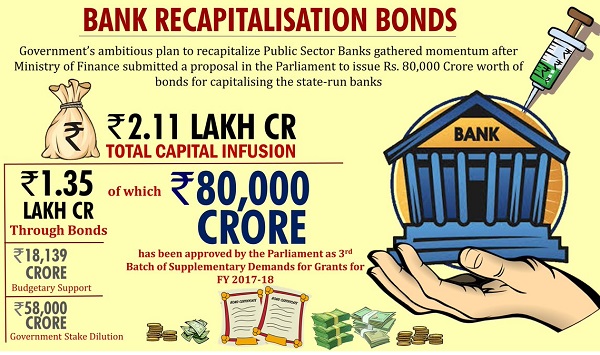Government announced Indradhanush plan for revamping Public Sector Banks (PSBs) in August 2015. The plan envisaged, inter alia, infusion of capital in PSBs by the Government to the tune of Rs. 70,000 crore over a period of four financial years. Government has recently announced decision to further recapitalise PSBs to the tune of Rs. 2,11,000 crore, through recapitalisation bonds of Rs. 1,35,000 crore and budgetary provision of Rs. 18,139 crore (the residual amount under Indradhanush plan) over two financial years, and the balance through capital raising by banks from the market. Government has so far infused capital of Rs. 59,435 crore in PSBs under Indradhanush.
Capital infusion is aimed at supplementing the achievement of regulatory capital norms by PSBs through their own efforts and, in addition, based on performance and potential, augmenting their growth capital. Government has announced that a differentiated approach would be followed, based on the strength of each bank.

Under the State Bank of India Act, 1955 and the Banking Companies (Acquisition and Transfer of Undertakings) Acts of 1970 and 1980, the Board of Directors of the bank is responsible for general superintendence, direction and management of the affairs and business of the bank. Further, Companies Act, 2013 provides that the directors of a company shall act in good faith and in the best interests of the company, its employees and the shareholders. Under the Banking Regulation Act, 1949, the Reserve Bank of India (RBI) has the power to remove managerial and other persons from office for, inter alia, securing proper management of any banking company.
This was stated by Shri Shiv Pratap Shukla, Minister of State for Finance in written reply to a question in Lok Sabha today.
Source- PIB




